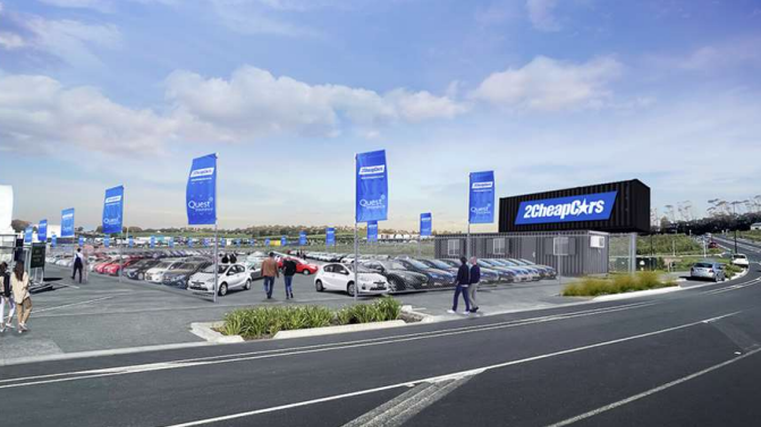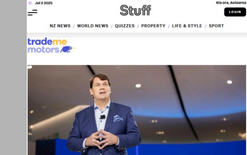Profit drops by $500k

NZ Automotive Investments Ltd (NZAI) has reported its half-year earnings to September 30 with net profit after tax (NPAT) coming within guidance.
The company says it was performing well in the first four-and-a-half months in the lead-up to Covid-19 alert levels being raised across the country in mid-August.
2 Cheap Cars’ was averaging 800 sales per month over the period, which was up by 27 per cent on the same coronavirus-affected period last year.
“Like other retail businesses, NZAI’s operations and the broader automotive industry were impacted by lockdowns relating during the latter part of half-year 2022,” says David Page, chief executive officer.
“NZAI’s subsidiaries, 2 Cheap Cars and NZ Motor Finance, could not fully trade for at least 45 days – or 24 per cent of the period.
“The company was, therefore, impacted by reduced car sales and the closure of the vehicle-processing hub in Mount Wellington under alert level four. Throughout the period, we have had to be agile in responding to the disruptions and uncertainty.”
Revenue and income came in at $31.2m during the half-year. This was an increase of 1.9 per cent compared to the same period last year despite an estimated $7.5m of lost opportunity in revenue due to virus-related restrictions.
EBITDA, including finance income, decreased from $4m to $3.2m over the same period.
“The effects of trading and operating restrictions brought about by raised alert levels, as well as additional corporate costs associated with becoming a listed company, contributed to the $0.8m reduction,” notes Page.
NPAT dropped by $500,000 from $1.9m in the first half of 2021/22 compared to $1.4m in the same period of 2021/22.
That was within guidance provided in September, “although at the lower end due to the extended nature of Covid-19 restrictions through the whole of September, particularly in Auckland”.
An interim gross dividend of 2.2 cents per share has been declared, representing a gross annualised dividend yield of 5.2 per cent based on a share price of 86 cents at close of trading on November 26, which is to paid on December 23. Earnings per share came in 3.1 cents compared to 4.15 cents last year.
Page adds: “This lockdown has been challenging. However, we have taken the opportunity to invest time enhancing key processes in the business. We are confident this will lead to efficiencies and improvement in the future as the used automotive industry bounces back from Covid-19.”
2 Cheap Cars
Despite the last part of the 2022 financial half-year being affected by virus-related restrictions, 2 Cheap Cars’ revenue was up by 3.4 per cent on the same coronavirus-affected period last year.
Profit per unit rose by 11.6 per cent with improved margins from increased sales of higher-value models and higher finance penetration. Average profit per car came in at $1,570.
It is estimated that Covid-19 impacted the retail business by an estimated $7.5m in lost revenue, which included a $300,000 offset from government subsidies received and growing the finance division’s loan book.
2 Cheap Cars sold 3,864 vehicles in the six months to the end of September, slightly down slightly from the same period of last year when it retailed 3,911.
Through the lockdown from mid-August to September, 39 per cent of vehicle sales were via a digital click-and-collect solution. For the half year, nine per cent of all sales were undertaken digitally. Last year, the company did not have this capability.
Page notes: “The supply of used vehicles from Japan remains consistent. Buyers have started to experience increased competition at auctions due to the knock-on effect that the semi-conductor shortage is having on new-car production.
“However, Toyota and Honda recently made some positive announcements that they are commencing production again, indicating the semi-conductor shortage may be improving.
“2 Cheap Cars has seen sales of electric and hybrid electric vehicles more than double to 21 per cent of all sales in half-year 2022, up from eight per cent over the same period last year. The company is well-placed to service the growing demand for this type of vehicle.
“The business continues to position itself to provide the solutions that customers are seeking in response to the government’s new clean car standard, meaning 63 per cent of all cars sold over the half-year would not attract a penalty under the regime when introduced in April 2022.”
2 Cheap Cars halted shipping from Japan in September, and extended some short-term trade facility contracts to November to preserve cash and hold inventory levels.
During the half-year, inventory turnover increased to 98 days from 92 due to holding extra inventory as the result of Covid-19 disruptions, while dealerships outside of Auckland operated at 90 per cent sales capacity at alert level two.
Page notes the used-car import market in New Zealand for the six months to September 2021 rose by 12 per cent compared to the 2020/21 half-year but remained down by 15 per cent on the same period in 2019/20.
As for the domestic fleet, a presentation to shareholders states: “The average age of vehicles on New Zealand roads is increasing and there are an estimated 800,000 light passenger vehicles nearing ‘scrapping’ age. Used passenger-vehicle imports make up 58 per cent of the entire passenger vehicle market and over 80 per cent of commuters use a light passenger vehicle to get to work.
“The release of the clean cars programme earlier this year is creating demand for more fuel-efficient vehicles, especially hybrid petrol-electric and fully electric vehicles. Rising fuel costs are pushing consumers towards more fuel-efficient vehicles.”
NZ Motor Finance (NZMF)
The automotive division grew its loan book by 139 per cent in the past year, on an annualised basis, for an increase from $2.1m to $4.9m as of September 30. The number of loans in the book increased to 625.
“NZMF continues to sell finance vertically through 2 Cheap Cars,” explains Page. “The business has diversified and recently signed two partnership agreements with third parties to grow lending and accelerate the build of the loan book.
“Selective lending to NZMF’s core audience has continued, and the business continues to maintain a low arrears rate of two per cent and has a write-off rate below 0.2 per cent.
“NZMF is in advanced stages of discussions to secure an additional $5m in debt funding to further grow the loan book.”
Automotive retail customers that required finance in the reporting period came in at 36 per cent with 4.3 per cent of retail car sales financed by NZMF.
Business outlook
“Demand has remained strong for used vehicles outside of Auckland during the Covid-19 restrictions and Auckland has shown signs of recovery in recent weeks,” says Page.
“NZAI has a solid platform to continue to execute its strategy. Demand remained strong for used vehicles across 2 Cheap Cars dealerships in November 2021 and the business expects to have an improved second half of the year under the new government ‘traffic light’ system, which should mean retail remains open for business.”
He adds the company remains focused on executing its long-term strategy to leverage its retail business to build a diversified automotive services group. Forecast demand for finance continues to be strong and
Page expects this to continue to grow in the coming year.
“The management team is setting the business up for growth and is executing on the move to the new-vehicle processing hub [in Onehunga] in January, which is expected to increase processing capacity and provide a safer and more engaging space for our people.
“Once set up, the business plans to expand its retail footprint and has already secured one new site at Westgate in Auckland (artist's impression above), which is slated to open in January, with others being actively pursued.
“Electric and hybrid vehicles made up 21 per cent of 2 Cheap Cars’ sales over the past three quarters. The company will continue to focus on the opportunity this presents to grow market share.”
In addition, the company is working to mitigate longer-term risks. While the supply of vehicles from Japan now remains consistent, buyers have started to experience increased competition at auctions. It will also “deliver uplift in worker engagement and retention”.





